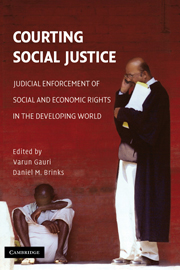Book contents
- Frontmatter
- Contents
- Foreword
- Preface
- Contributors
- 1 Introduction: The Elements of Legalization and the Triangular Shape of Social and Economic Rights
- 2 Litigating for Social Justice in Post-Apartheid South Africa: A Focus on Health and Education
- 3 Accountability for Social and Economic Rights in Brazil
- 4 Courts and Socioeconomic Rights in India
- 5 The Impact of Economic and Social Rights in Nigeria: An Assessment of the Legal Framework for Implementing Education and Health as Human Rights
- 6 The Implementation of the Rights to Health Care and Education in Indonesia
- 7 Transforming Legal Theory in the Light of Practice: The Judicial Application of Social and Economic Rights to Private Orderings
- 8 A New Policy Landscape: Legalizing Social and Economic Rights in the Developing World
- Index
Foreword
Published online by Cambridge University Press: 27 July 2009
- Frontmatter
- Contents
- Foreword
- Preface
- Contributors
- 1 Introduction: The Elements of Legalization and the Triangular Shape of Social and Economic Rights
- 2 Litigating for Social Justice in Post-Apartheid South Africa: A Focus on Health and Education
- 3 Accountability for Social and Economic Rights in Brazil
- 4 Courts and Socioeconomic Rights in India
- 5 The Impact of Economic and Social Rights in Nigeria: An Assessment of the Legal Framework for Implementing Education and Health as Human Rights
- 6 The Implementation of the Rights to Health Care and Education in Indonesia
- 7 Transforming Legal Theory in the Light of Practice: The Judicial Application of Social and Economic Rights to Private Orderings
- 8 A New Policy Landscape: Legalizing Social and Economic Rights in the Developing World
- Index
Summary
I believe it is important for governments and international institutions, including the World Bank, to encourage research into social and economic rights in developing countries, and I welcome this excellent work on the topic. The enforcement of these rights represents a new and controversial area of judicial intervention. Social and economic rights fall into that category of rights, often referred to as second-generation rights, that also includes cultural and developmental rights. They are distinguished from first-generation rights, which consist of political and civil rights such as equality and the freedom of speech and of assembly.
Second-generation rights were recognized in the 1948 Universal Declaration of Human Rights and given effect in the International Covenant on Economic, Social, and Cultural Rights, which became effective in 1976. However, until comparatively recently, these rights were not taken seriously and were subordinated to civil and political rights. Few states took steps to entrench such rights constitutionally or to adopt legislation or administrative provisions to make such rights enforceable.
A common objection to giving courts jurisdiction over second-generation rights is that judges are ill equipped to adjudicate on the manner in which the legislative and executive branches of government determine how the national budget should be allocated. In countries like the United States of America, there is an additional objection – traditionally only negative rights are enforceable and the courts are regarded as not having jurisdiction to adjudicate positive rights.
- Type
- Chapter
- Information
- Courting Social JusticeJudicial Enforcement of Social and Economic Rights in the Developing World, pp. vii - xivPublisher: Cambridge University PressPrint publication year: 2008
- 2
- Cited by

